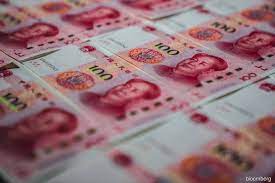BEIJING (Reuters): China will resolutely guard against overshooting risks of the yuan exchange rate, People’s Bank of China (PBOC) Governor Pan Gongsheng said, according to a report on Wednesday by Financial News, a newspaper owned by the PBOC.
The comments come as the Chinese yuan has lost more than 5 per cent so far this year to become one of the worst performing Asian currencies, in light of the widening yield differentials with other major economies and an uneven domestic economic recovery.
China will prevent the formation of one-sided and self-reinforced market expectations in the Chinese yuan, Pan said at a financial forum in Beijing.
Despite losses against the greenback, Pan said the yuan’s value against a basket of currencies was largely stable, while the yuan appreciated slightly versus other non-dollar currencies.
The yuan’s trade-weighted CFETS yuan basket index stood at 98.49 on Wednesday, down 0.18pc year-to-date, according to Reuters calculation based on official data.
Pan also reiterated that China is capable of maintaining the prudent operations of the foreign exchange market and the yuan will be basically stable, reasonable and balanced.
‘WILL ACHIEVE GROWTH TARGET’
China is expected to achieve its annual gross domestic product growth target of 5pc this year and will maintain prudent monetary policy to revive real economic growth, the central bank governor was quoted saying by state media on Wednesday.
Growth momentum has improved recently with production and consumption recovering steadily and employment and consumer prices remaining stable overall, Pan Gongsheng said at a forum, according to the Securities Times.
Beijing has set an economic growth target of around 5pc for this year.
Monetary policy deliberations will pay closer attention to cross-cyclical and counter-cyclical adjustments, said Pan.
China is scrambling to revive growth after a brief post-COVID-19 bounce faltered amid a protracted property market slump and local government debt risks.
Economic indicators released on Tuesday showed imports unexpectedly swung to growth in October while exports contracted at a quicker pace.
Pan said he would push financial institutions to keep stable financing channels open through property credit and bonds to help address real estate weakness.
The central bank will also provide liquidity support to areas with high debt when necessary, according to Pan.
Pan also said he will strictly control investment in new projects in areas that have high debt burdens.







